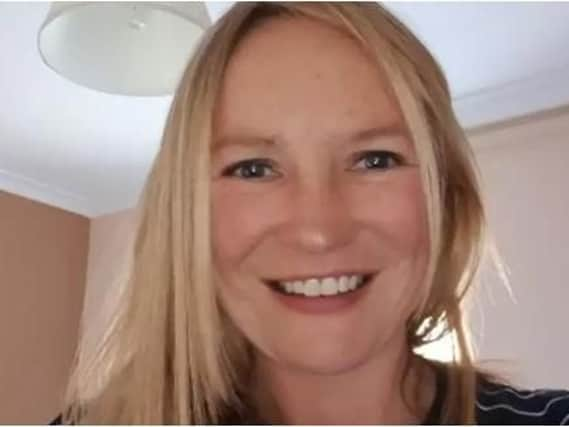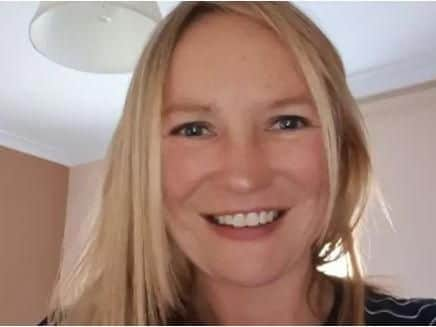Couple praise Yorkshire hospital nurses who 'never stopped' to save mum who suffered stroke aged 38


He called out to his partner, Wendy Curtis, at the home in West Yorkshire.
“It was about 5.30am,” Mr Cran, 41, said.
“She wasn’t answering me.


“I went in and she was in a ball on the bathroom floor. She couldn’t sit up. One side of her body was paralysed.
Advertisement
Hide AdAdvertisement
Hide Ad“I dried her off and laid her on the carpet while I rang for an ambulance.”
In the distressing hour that followed their loved ones would soon learn that Leeds mum-of-one Ms Curtis, who is just 38, had suffered a stroke.
She was one of a handful of patients to be admitted on December 28 to Leeds General Infirmary’s Acute Stroke Unit where staff, in the space of a frantic 12 hours, dealt with the same number of patients that they would normally see across a whole week.
But, now recovering after a successful operation to remove a blood clot, Ms Curtis is today praising the care she received from surgeons, doctors and nurses in the unit as part of the YP-backed Big Thank You campaign.
Advertisement
Hide AdAdvertisement
Hide AdHer partner, dad-of-three Mr Cran, from Seacroft, said her recovery, after quick-thinking staff fast-tracked her for surgery, had been remarkable.
“Straight away when we got to hospital they knew it was a stroke.
“All of her left side was gone.
“At one point I just couldn’t speak out of fear that she would go. I didn’t know whether she was going to come through it or not.
“Where she is now, it’s just unbelievable. People won’t believe the difference the operation has made.”
Advertisement
Hide AdAdvertisement
Hide AdIn what has been a testing 12 months for the couple, the stroke came after Ms Curtis, who was born with congenital heart disease, was diagnosed with breast cancer in September 2017.
The pair had planned their holiday to Tenerife after she had battled through and beaten the disease.
After arriving at the unit, the couple were met by the Brain Attack Team, a specialist group of staff who carry out assessments, speak to family and talk through treatment options.
Time is critical when it comes to stroke symptoms as, the longer the wait, the higher the chance of permanent brain damage.
Lifesaving procedure
Advertisement
Hide AdAdvertisement
Hide AdMs Curtis was first given the thrombolysis drug, a fluid which can break down blood clots.
Soon after, she underwent a thrombectomy, a procedure to remove a clot using a wire and rods.
Mr Cran said he was told that there was a “one-in-ten” chance that the surgery would work for his partner, who was left with limited mobility and speech.
“But it worked,” Mr Cran said, as a smile washed over his face.
“They did that and she came back.
Advertisement
Hide AdAdvertisement
Hide Ad“Before, she still couldn’t move. The difference was massive.”
More astonishing, Ms Curtis, because of her previous medical conditions, had to undergo the procedure under local anaesthetic, meaning she was awake while the surgery was happening.
“I remember them telling me what was going to happen,” she said.
“The surgery was quite painful because I was awake.”
She has continued to improve after one week in hospital following the operation, and could be discharged as early as today.
Advertisement
Hide AdAdvertisement
Hide AdMs Curtis has regained her speech and mobility, though had still found it difficult to swallow.
“We should be on holiday sipping cocktails,” she giggled. “But I feel very lucky now. The physio, speech and language therapists say I’m doing really well.
“My mobility is back to normal.
“I just need to learn how to eat again now.”
Big Thank You for 'personal' hospital staff
Both Ms Curtis, from Boston Spa, and her partner have praised the outstanding care she received from quick-thinking NHS staff.
“The staff were very personal,” she said.
“They made me feel like they were just looking after me, we didn’t know there were other patients.
Advertisement
Hide AdAdvertisement
Hide Ad“The surgeon every came to see me in the morning [on Friday]. He said ‘you probably don’t remember me but I wanted to come by and see how you were.’
“It was nice of him to do that.”
Meanwhile, Mr Cran said he was taken back by how quickly staff reacted.
“The surgeon didn’t wait,” he said.
“They just went for it straight away.
“It’s all down to the doctors, surgeons and nurses who were on in that moment.
“It all happened in about an hour.
“The nurses were so fast. I have never seen people move so quickly.
Advertisement
Hide AdAdvertisement
Hide Ad“The staff never stopped, running and opening doors for us.”
Senior nurses on the unit have also spoken of their pride at how the Brain Attack Team managed an unprecedented 12-hour shift with so many patients. Alastair Bailey, lead nurse on the team, said: “It really was an extraordinary day but we dealt really well with it. It’s a testament to the team.
“It was just constant: as soon as we had dealt with one patient, another came in with acute symptoms of a stroke.”
He praised the Brain Attack Team who acted so quickly on the day, including Sharon Fry, Kelly Reid, Jessic Wardle, Dr Ana Garcia, Dr Lucy Hicken and Dr Nayyar Saleem.